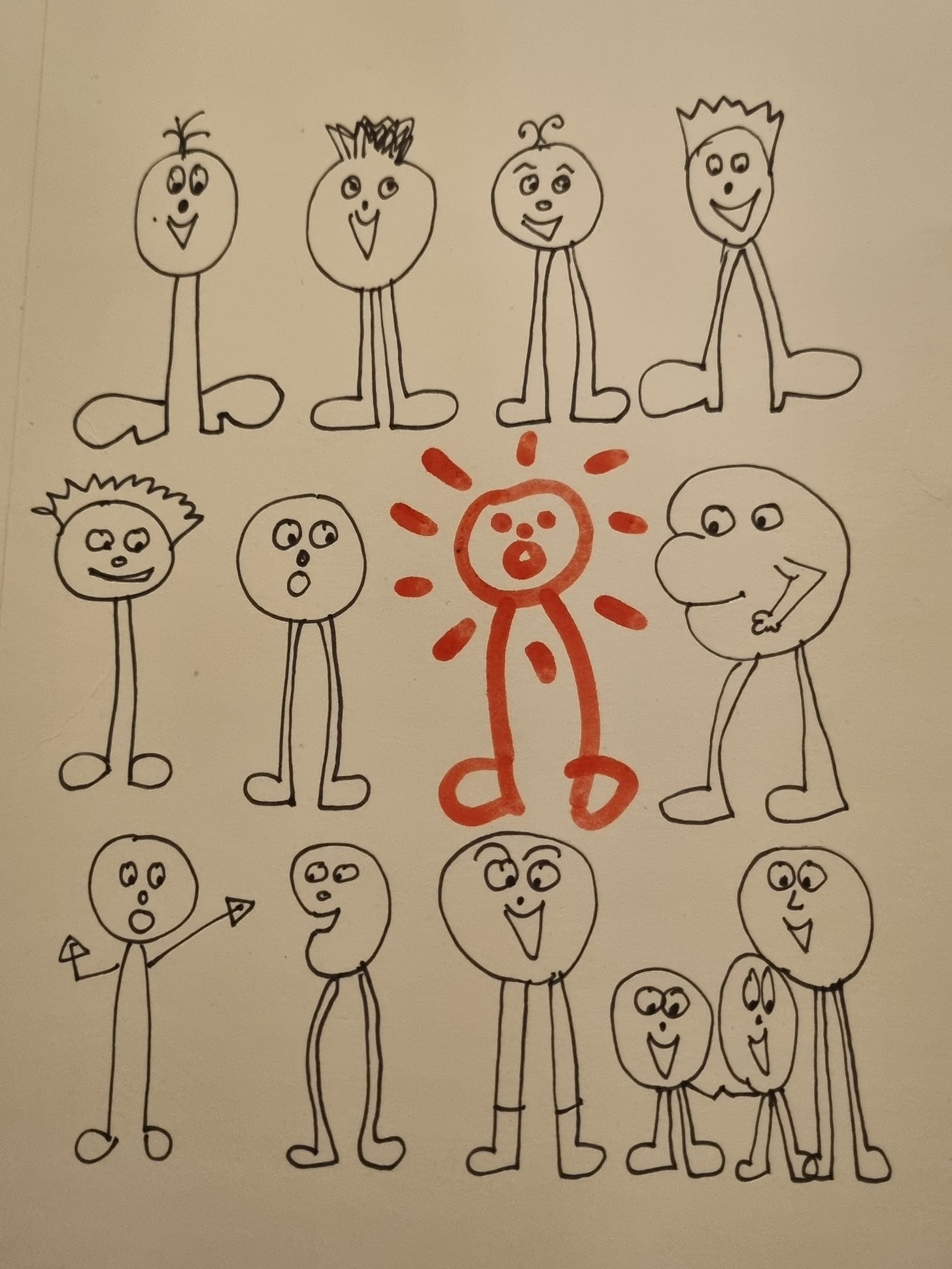Toxic People and Other Stories
Liz Buchanan recommends taking the 'toxic' narrative with a pinch of..... Dynamite?
Watch out! They are soo hard to spot.
They look completely normal.
But they are ruthless. RUTHLESS, I tell you!
And they are everywhere.
I'm talking about Toxic People. If you don't know how to recognise a Toxic Person, or wouldn't know one if you found yourself chatting to one in the winter gardens, simply teach yourself everything you need to know by reading pseudo-science articles on your social media.
If your partner does more than three of these things, they are toxic...
Why do you keep meeting Toxic People in your life?
Which Toxic Behaviours are people using on you?
Toxic People always make everything about them.
Toxic People always make everything Your Fault.
Toxic People always leave you feeling rubbish.
It annoys me, the factual tone that these articles use, because scientifically speaking, people are not Toxic - unless, perhaps, you ate their liver or they actively spiked your drink. But how much is too much? How far is too far? What is a mistake and what is Toxic? It might be the scientist in me talking, but if there isn't an objective boundary, then pointing at people and calling them that is hardly fair. Let's look at it through the Toxic Person's eyes: are many people, even the ones you don't like, deliberately trying to burn holes in other people's well-being for kicks, while trying to convince you that they're a goody? It seems to me that only pantomime villains would do it. And what about the word 'always?' Do people ever consistently behave the same way every time? Do they have to, for it to count?
People can do wrong by accident - I'm sure that I scuff boundaries frequently. Sometimes, I guess where people's boundaries lie and get it wrong. Small accidental infringements are not the same as Toxic behaviour. Most of us - providing that we're sufficiently self-aware to notice - have damaged someone's self-esteem in the 'boundaries' game. Given, taken or expected too much in the continuous 'give' and 'take' push and pull. But how much is too much? How far is too far? What is a mistake and what is Toxic? It might be the scientist in me talking, but if there isn't an objective boundary, then pointing at people and calling them that is hardly fair.
Picture God, sitting up on cloud nine, swinging her legs, watching me (on her mobile, 'cos she's modernised like the rest of us). I'm sure that sometimes she's spotted my avatar flashing yellow, because I'm over a Toxic threshold. Maybe she's merciful after all, and will replenish my hearts like on free Duolingo. But at times in my life, she must have felt I was Toxic and her hand must've hovered over the button labelled 'Smite.'
I should have been Smited - Smoted? Smitten? - back in my late teens. Word-bending alert - not being smitten was the problem. I'd met a nice, respectable boy, with a nice career ahead of him, whom everyone said was a 'catch.' And initially, I was quite pleased with myself. It took me too long to realise that I'd understood the game wrong - that the aim wasn't to have a nice boy love me. The truth I hadn't grasped was, I was meant to feel something back.
I can distinctly remember working out that I didn't feel about my relationship as others felt about theirs. I explained to my bloke that we should break up. He told me that that wasn't okay; that he hadn't done anything to deserve it. By 'dumping' him, I was showing my true colours as a horrible person. I didn't hear his disappointment talking; I believed his every word. For a whole year longer, I continued dating that man because it was ingrained in my psyche that nice girls didn't hurt people. That it wasn't okay to say 'I love you' and then change my mind.
For his part, despite somehow convincing me that I was morally wrong to walk away from a relationship that I didn't want to be in, my ex-boyfriend never set out to be controlling. He was a well brought-up boy; reasonable company. In lots of ways, we supported each other. He saw himself as a good guy trying to hold a fickle girl, who didn't know what was good for her. He listened to Meatloaf; he knew that men were supposed to fall hard. He told himself that he was unreasonably, obsessively in love and he didn't want to take 'no' for an answer. And I was just far too passive and convinced it was wrong to hurt his feelings. I didn't say what my heart needed to say, firmly enough that he heard.
Anyway, I believe that we are both in different, happy relationships now. Toxic People are supposed to be 'incapable of having positive relationships.' It wasn't us who were Toxic; it was the relationship. We had a mismatch in wants.
Over the twenty years that have passed since then, I have spoken with so many women who have found themselves in similar situations. I understand too easily how societal pressures interfere with people's inner voices. The pressure not to upset people; the pressure not to 'lead them on;' the pressure not to have sexual appetites; the pressure to have sexual appetites; the pressure to marry within one's faith; the pressure to have 2.4 kids. So many women of my age tell me that they married before they were ready. 'I settled,' they'll say, as though it's not a form of self-harm.
I didn't settle on the boyfriend, of course; I cheated. Well actually, I didn't - but he thinks I did. It was unconsummated cheating; I'm not sure if that makes it better or worse. But it went a long way to convincing him that 'no' was really the answer.
Anyway, let's return to toxicity in relationships. Nobody behaves perfectly all the time. Even the most 'together' couple you know have chronic issues with something. Perhaps one of them avoids the washing up at all costs; sometimes this can be ignored. But mismatches can be much bigger; in how much sex to have, in how it is handled; mismatches in ways of showing love and how it is resolved. Mismatches in how people want to spend their time.
Here's the thing; mismatches don't have to be toxic. The negotiation of boundaries takes willing and honest participants. Maybe a Toxic relationship is one where the boundaries are not negotiated well on either side or both. Hold that thought.
Nearly a whole generation after my doomed first relationship, the kids' school term is about to start. My kids will be learning the twelve-times table and trigonometry. They will learn things that someone called Jesus said to his friends, 2000 years ago. But where are the lessons about boundaries? Where school failed both myself and my super-well-qualified ex?
How important it is that our children don't leap from 'Someone makes me uncomfortable' to 'They're Toxic.' I want them to think, 'Why do they think differently? What is the truth? Can we build a healthy boundary here?' And - because it's important - 'Should I be trying to do that?' I believe that healthy boundaries are more important to children than maths. That they need to be able to settle arguments better than with roasty one-liners.
I still don't know what Toxic means in this context; it's too subjective a word with only a vague definition. But it is true that some things definitely are it, including some relationships. I think that gives us a mission to pass a legacy on to our children.
I wonder if we could teach the next generation to have relationships better than that?
Thanks Liz, it’s amazing how we scan dozens of potentially ‘toxic’ memes across social media, and just let it wash over us without too much critical thinking - it would be great to read more from our friends across Sheffield on messages that dig away at our good nature, and how we can think more constructively for ourselves.
Please reach out if you have your own thoughts on toxic memes, people or anything you really care about - we’re looking to connect beyond the superficial here and through Love Sheffield.






